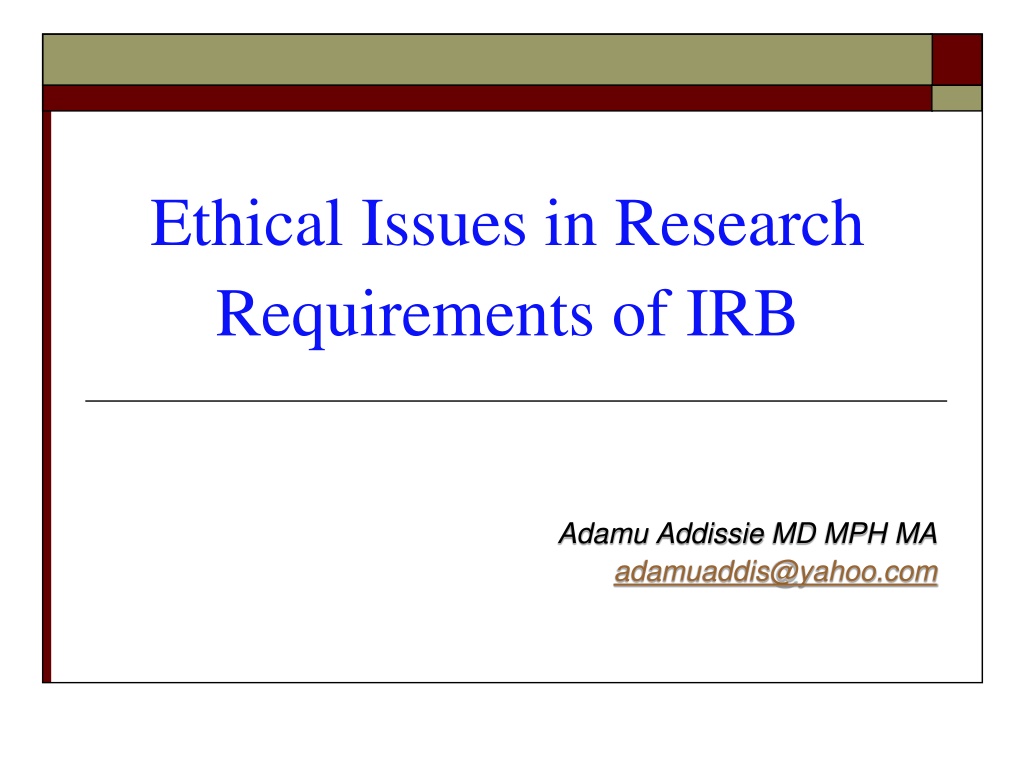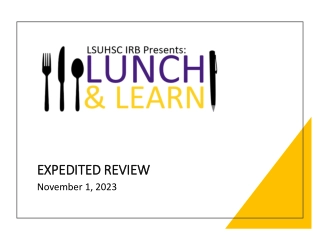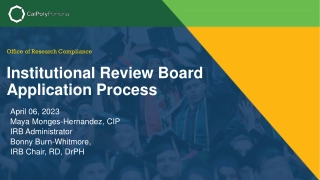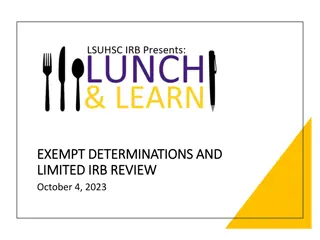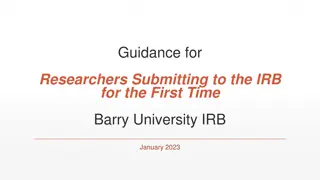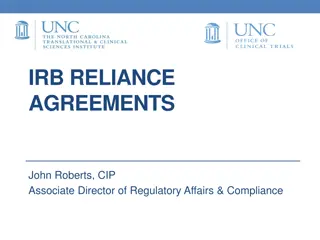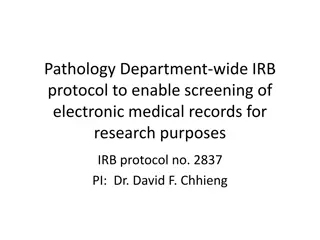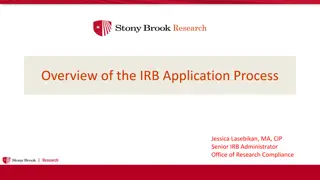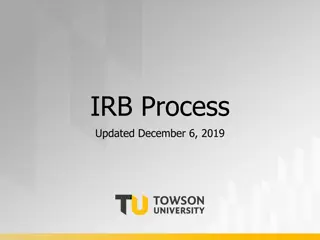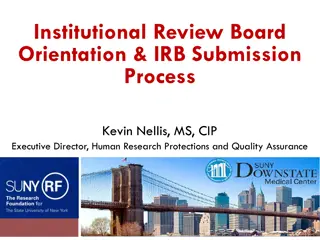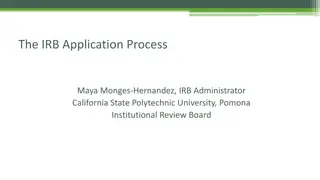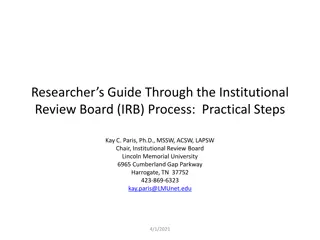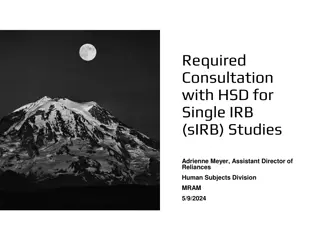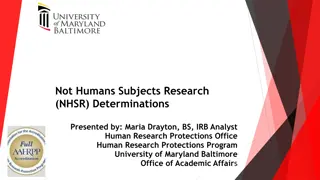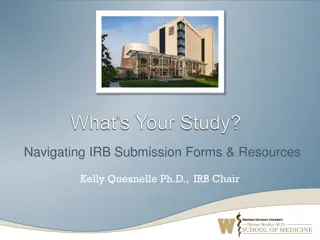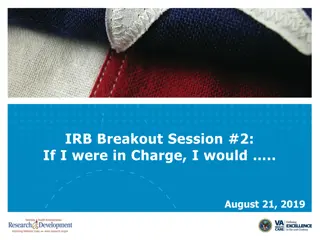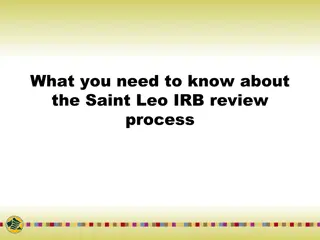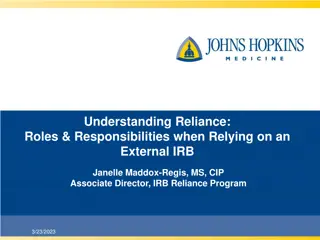Understanding Ethical Issues in Research and IRB Requirements
Delve into the realm of research ethics and the pivotal role of Institutional Review Boards (IRBs) in safeguarding human subjects. Explore the historical backdrop of unethical research practices and the evolution of bioethics. Emphasize the imperative adherence to ethical standards in scientific inquiry.
Download Presentation

Please find below an Image/Link to download the presentation.
The content on the website is provided AS IS for your information and personal use only. It may not be sold, licensed, or shared on other websites without obtaining consent from the author. Download presentation by click this link. If you encounter any issues during the download, it is possible that the publisher has removed the file from their server.
E N D
Presentation Transcript
Ethical Issues in Research Requirements of IRB Adamu Addissie MD MPH MA adamuaddis@yahoo.com
Objectives Importance of research ethics Introduce the IRB and its functions Revise the format (template) and other requirements of IRB and the formats for responding to comments 1. 2. 3.
Proposal Title Cover page Executive summary Introduction and back ground Research hypothesis Literature Review Research Objectives Methods Work plan Budget Appendices Data collection tool Consent form References
Outline What makes Ethical Research? IRB Requirements
Introduction ??? What is the right thing to do in life has been a quest for man for years ??? Philosophers and thinkers were trying to answer this question (Moral Judgment) Ethics was one of the volumes or Aristotle Hippocrates and Hippocratic Oath (Paternalistic) Religion has a range of answers for such a question Reproductive technologies Human dignity Bioethics as a discipline evolved eventually with the advances in medical technology and science
Introduction There have been historical cases of unethical research that have contributed to how we work with participants today. Some Examples: The unethical Nazi experiment (WWII) The Tuskegee Syphilis study (1932-1972) The Laud Humphrey's "Tearoom Sex" study (1960s) Humphrey s PhD These studies led to the creation of the Belmont Report and the Institutional Review Board (IRB) which were formed to protect human subjects involved in research.
Introduction Epidemiologic Research Collection of personal and private data Potential for abuses Inevitable conflicts between rights/freedom of an individual and the needs of the society Advances in biotechnology Involvement of vulnerable groups like minors, disabled etc
Introduction Epidemiology exudes an air of objectivity and many of its practitioners seem to loathe to accept that it is far from being value free either in its theory and methods or in its application. Indeed, even in its compilation and presentation of data epidemiology involves value judgements and ethical choices Mooney and Leeder
Introduction Effective PH activities depend on a trusting relationship between public health practitioner and the society they are trying to assist
Introduction PH Practitioner Society / Public TRUST Appropriateness of activities, Risk-Benefit Balance, Professional Responsibility and Accountability etc Public has an interest in ensuring that PH activities are conducted in an ethical manner
Why Research Ethics? Research is itself ethical However: Tuskegee, research with prisoners etc. More generally: patients are vulnerable Sick Care or science? Dependency and pressure / seduction
Research ethics: involves the application of fundamental ethical principles to a variety of topics involving scientific research. These include the design and implementation of research involving human experimentation, animal experimentation, various aspects of academic scandal, including scientific misconduct (such as fraud, fabrication of data and plagiarism)
Definitions Ethics: Def 1: (Last) the branch of philosophy that deals with the distinction between right and wrong, with the moral consequences of human actions Def 2 : (Webster) the discipline that deals with good and bad, or right and wrong, or with moral duty and obligation
Ethical Frameworks Utilitarian Theory Kantian (Deontological) Theory Virtue Theory Casuistry Right-Based Theories: Communitarian Theory: Principlism: The Four Principle Approach (Autonomy, Beneficience, Non maleficience, Justice) 1. 2. 3. 4. 5. 6. 7.
Some Moral/Ethical Questions in Epidemiologic/PH activities (1/3) Do my reasons for undertaking this activity reflect self-interest or desire to benefit the community? (Autonomy) What are the potential benefits and harms from the activity that is being considered? (Beneficence/Nonmaleficience) Who will benefit, who will be harmed and who will bear the costs? (Beneficence/Nonmaleficience) Am I maximizing the benefits and minimizing the harms to the population involved? (Utilitarianism) 1. 2. 3. 4.
Some Moral/Ethical Questions in Epidemiologic/PH activities (2/3) 5. Are the benefits reasonable in light of the expected harms and costs? (Deontology /Kantian) 6. How have similar ethical problems been approached in the past? (Casuistry) 7. Have community representatives been involved in developing this activity, and if so, how does the community view this activity? (Communitarianism)
Some Moral/Ethical Questions in Epidemiologic/PH activities (3/3) 8. Am I violating the real or perceived rights of any one in carrying out this activity in the way I propose to do it? If so, have I taken steps to minimize the adverse impact on individual rights and maximize the benefits to society from activity? (Right Based) 9. How should I carry out this activity to respect persons and assure that the benefits, harms and costs are distributed equitably in the population? (Justice) 10. What virtues should I demonstrate? (Virtue)
The Obligation of Epidemiologists/Researchers (1/2) Minimizing risk and protecting the welfare of participants Providing benefits Protecting confidentiality and privacy Informed consent Peer review Maintaining public trust 1. 2. 3. 4. 5. 6.
The Obligation of Epidemiologists/Researchers (2/2) Objectivity, Conflict of interest and Partiality Communicating with trainees colleagues, employers, and sponsors about Ethical requirements and confronting unacceptable misconduct Obligation to communities 7. 8. 9.
Conclusion Ethics is important principle in life !!! Human research should follow ethical principles and standards Though Biomedical Ethics is not well developed it should be always respected.
What makes Ethical Research? Every research project should be scientifically sound, methodologically robust and ethically sound
What is IRB? Independent Institutional Review Board
IRB-MF Is a committee formally designated by the Faculty Academic Commission (AC) The faculty AC designates members that serve for a term of two five years, the members will elect their own chairman and secretary
Departmental Research Ethics and Review Committee (DRERC) Each department and school is allowed to have DRERC that best reflects its size and discipline Provides first tier review of proposals in terms of format, scientific and ethical merits and relevance of design Maintain confidentiality of research review and give due emphasis to declaration and ways of handling conflicts of interest
IRB-CHS Will determine and certify that all human subjects research projects, regardless of funding, conform to the regulations and policies regarding the health, welfare, safety, rights and privileges of human subjects. These goals include ensuring that each research participant is informed of their rights and is able to give informed consent. Will assert that researchers duly assure the welfare of their research participants Assures the scientific and ethical merits of biomedical research Provides guidance, advice, and decision (approval/recommendation/stipulation/disapproval) on health research or other specific research protocols involving human subjects and animal studies
IRB-CHS The Faculty is in the process of being transformed in to College of Health Sciences with expansion of graduate training and research programs All research projects involving human participants conducted by faculty staff and students associated with the faculty must receive approval from the IRB prior to initiating the research IRB may recommend some studies for further review and approval by the former Ethiopian Science and Technology Agency (ESTA)
IRB Functions and Responsibilities Follows written procedures (SOP) Safeguard the rights and welfare of subjects at risk in any research activity Determining whether the subjects will be placed at risk Assessing the scientific merits and quality of research proposals submitted Review and approve any activity involving human subjects only when the PI is a faculty member, staff or student Review and monitor the conduct of an approved activity at intervals determined by the IRB
Review Criteria Proposals are evaluated for rating the scientific and technical merit of the Proposed Significance: Approach: Innovation: Investigators: Risks: Selection of Subjects is equitable: Informed Consent: Monitoring: Confidentiality: A proposal does not need to be strong in all categories to be judged likely to have a major scientific impact. E.g. an investigator may propose an important work that is not innovative but essential to move a field forward
Research Determinations Approved: Approved with Recommendations for Minor Revisions: Approved on condition (Major Revision): Disapproved:
Researches requiring referral: National Ethics Review Committee (NERC) of ESTA All clinical trials research on very sensitive issues e.g.. HIV/AIDS, mental issues, prisoners, children Multicentre collaborative research Research financed and carried out by external donors International agencies Research to be conducted in more than one region Projects require sample transfer Research related to radiation, laser, biohazards, prohibited/restricted materials
Guidelines Handling Health Care Information (HCI): Specimens (blood, urine, tissue, and human products), records (financial, pharmacy, x rays, CT scans, MRI etc), diagnostic specimens, pathologic specimens and residual specimens Should be coded and stored safe Consent form must clearly state that the specimens were donated for medical research purposes
Privacy: Is the subjects personal right to authorize or decline access to personal (private) information Even though, incapacitated adults and children are unable to control access to their privacy, they still have the right to privacy Informed consent process should disclose any risk to privacy
Conflict of Interest Should be declared and stated
Guidelines Payments/Compensation As much as possible, it is not encouraged that to pay participants in any form due to the potential that such practice could be coercive bordering unethical research participant recruitment Remuneration could be given based up on the time involved, the inconvenience to the subject, the amount of expenses incurred while participating and should not be large so as to constitute a form of undue influence (coercion)
Guidelines Informed Consent: Information (SIS) Consent/Decision: permission or agreement of participant or parents or guardians
Types Written Verbal
Elements of Informed Consent Purpose and justification of research Expected duration of participation Selection criteria Description of any reasonably fore seeable risk Any benefits for the subjects Any disclosure of procedures Confidentiality Compensation if there is more than minimal risk Whom to contact if there is question Participation and non participation Contact address Signature Date
For Additional Information for Special Types see Guideline
Waiver of consent The research involves no more than minimal risks to the subjects The waiver or amendment will not adversely effect the rights and welfare of the subjects The research could not practicably be carried out without the waiver of amendment Whenever appropriate, the subjects will be provided with additional pertinent information after participation
Extra Caution with Vulnerable Population Pregnant Women, Human Fetus, Neonates Children Prisoners Adults who lack decision making capacity Students and staff
Assent Affirmative agreement of the potential participant to participate in the research Usually required for research involving children and adults with limited capacity to consent [ Diminished capacity to provide free & informed consent] Assent means child s agreement to participate in the research Permission means the agreement of parent or guardian to participation of their child in the research
Study Information Sheet (SIS) Title of the project Background of the study (Summary) Objective Significance of the study Study site and period of the study Study procedures (e.g. amount of blood sample) Potential risks/Benefits associated Samples storage (if indicated) Compensation (if indicated) Confidentiality/Justice/Privacy Rights of participation (Voluntary Participation) Termination of the study (participants are free to withdraw from the study at any time, and this will not have any impact on their subsequent management) Questions, rights and complaints (Specify the address of contact person)
IRB Requirements I. TITLE PAGE : with full description of Investigators and co- investigators Name of PI and Collaborators Address City Region Telephone Postal Code E mail Type of protocol (Screening/Survey/Clinical Trial etc)
